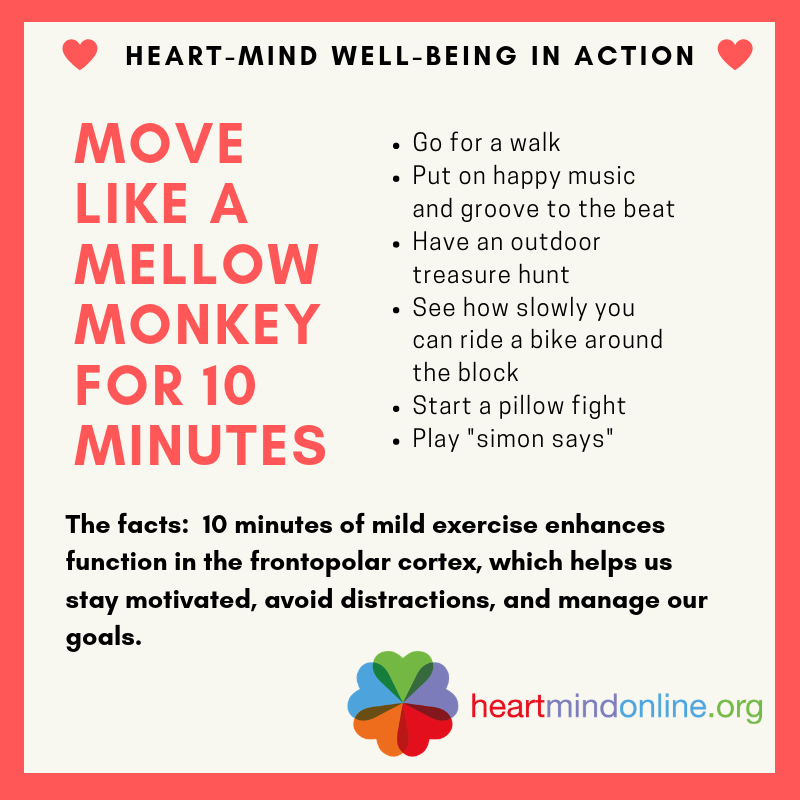
New insights from neuroscience suggest that one simple activity can help children and youth increase the strength of the part of their brain that allows them to stay on-track and focused on their goals, even in the face of distractions.
Being a mellow monkey to tame the not-quite-monkey mind
While our modern world is full of distractions that our primate ancestors never encountered in the wild, the secret to boosting our children’s ability to stay on-track with their goals may lie in how a tiny region in the front of our brains evolved differently from monkeys hundreds of thousands of years ago – the frontopolar cortex[1].
The frontopolar cortex:
- Is located in the front and center of the brain
- Allows us to manage multiple goals and distractions (it does this by keeping track of the goal we are currently working on, as well as other goals we have in mind to complete later, and allows us to switch back and forth between them[2])
- Helps us stay motivated when the going gets tough[3]
- Evolved to be larger and more powerful in humans than in other primates
- May be responsible for our uniquely human abilities such as language, abstract thinking, and long term planning
Neuroscience says: Exercising at a mild intensity[4] for as little as 10 minutes has been shown to strengthen activity in the frontopolar cortex[3], leading to enhanced functioning. Based on our knowledge of the role of the frontopolar cortex, this means that as little as ten minutes of walking, light cycling, or easy swimming could help us and our children manage multiple goals more efficiently and stay motivated in the face of challenges.
Taking it further:
- For young people who can confidently read, a fun way to measure the effects of this exercise is to take a STROOP test[5] before and after your mellow monkey exercise break (this is part of how scientists can measure cognitive function[6]).
- To keep things interesting (and challenging!), check out different versions of the STROOP test: an animal version, a number version, and a directional version.
- Check out this article and this video to learn how educators are creatively putting mellow monkey exercise breaks into action, with great results!
- Strengthen your prefrontal cortex, the larger brain region in which the frontopolar cortex is located.

You can use the BORG Rating of Perceived Exertion Scale to ensure you are exercising at the right intensity. You should feel comfortable and not out of breath.
Mild exercise, which is what we are aiming for here, should fall between 8-11 on this scale. Click the link below for a guide.
In this exercise, used to test cognitive functioning, participants time how long it takes to read two sets of words aloud. In traditional variations, the participant has to say the name of the colour the text is written in – not what the word spells. Click "more" to try it out yourself, and just try not to laugh as you find yourself hopelessly tongue tied!
In theory, the difference between the time it takes to say the first and second set of words should decrease after 10 minutes of mild exercise, showing improved cognitive function. Keep in mind that this may not always the case in real life.
The ability to store an in-progress task in a pending state – and then return to it – is referred to as “cognitive branching,” and is an integral part of goal-directed behavior.
While it may feel nearly effortless to us, monkeys can’t do it – which is one reason why scientists think that the frontopolar cortex may be to thank for our superior goal-management skills!
A 2018 Swiss study found that using transcranial brain stimulation to enhance activation in the frontopolar cortex increased participants’ willingness to perform demanding cognitive or physical tasks in order to receive a reward.
The study tested the role of the frontopolar cortex in deciding if a reward is worth the work needed to achieve it. Reserachers applied transcranial direct current stimulation, a non-invasive brain stimulation technique, to affect excitability of neurons (brain cells) in the frontopolar region. Participants then decided if they were willing to exert a specific level of mental or physical effort in order to receive a monetary reward. The study found that participants who received anodal transcranial stimulation, which is used to enhance brain activity in a region, were more willing to exert effort in cognitive and physical tasks in order to receive a reward than participants receiving no (control) or inhibitory (cathodal) stimulation. From this, the researchers concluded that enhancing (anodal) stimulation of the frontopolar cortex increased motivation towards demanding tasks by counteracting the devaluation of rewards caused by higher effort levels.
In a 2012 study conducted in Japan, researchers examined the effect of a single 10-minute mild exercise session on executive function and activity in associated brain regions. They found that this kind of exercise improved cognitive function generally, and increased activity in the frontopolar cortex specifically.
In the study, participants completed a color-word matching Stroop test and a measurement of psychological mood before and after 10 minutes of light cycling (experimental group) or 10 minutes of rest (control group). The researchers measured brain activity using non-invasive function near-infrared spectroscopy, which measures changes in blood flow in the outer layer of the brain (cortex) as an indicator of neural activity in this region. The study found that 10 minutes of mild exercise increased arousal levels (feelings of alertness) that correlated with increased activity in the frontopolar cortex and dorsolateral pre-frontal cortex, and that increased activation in these regions was linked to improved cognitive performace.
The frontopolar cortex is located at the very front of the prefrontal cortex, the brain region responsible for executive functions such as problem solving, comprehension, impulse-control, creativity and perseverance.